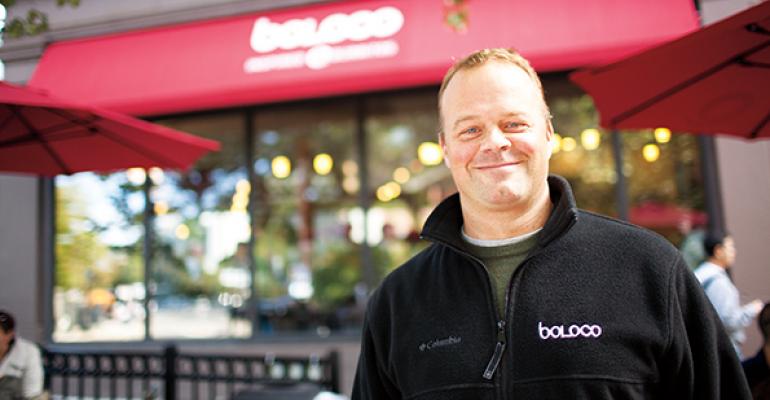Two years after leaving the company he founded after a major investment deal collapsed, John Pepper is back with Boloco, but this time he’s trying to keep the Boston-based burrito chain afloat.
The 17-unit concept closed a pair of locations in recent weeks, and other closures could come as the entrepreneur, who two years ago had plans to double in size, now just hopes to build a profitable business.
“We’re not a growth story, anymore,” Pepper said in an interview with Nation’s Restaurant News. “It’s all about running a responsible business and rightsizing overhead. When you’re not growing, you need to be profitable.”
Pepper helped found Boloco in Boston in 1997. By 2013, the chain had 22 locations, investment from a private-equity firm and a board of directors that included some high-profile names, such as Chopt CEO Nick Marsh and Noodles & Company CEO Kevin Reddy. It also included Pepper’s father, John E. Pepper Jr., the former chairman of The Walt Disney Company.
But Pepper walked away from the company two years ago following the collapse of a $15 million investment proposal from an unnamed firm — apparently over a dispute involving control of the chain. In a Tumblr post describing the turn of events, Pepper said the funds could have helped the chain expand to 60 locations by 2016.
Boloco struggled without its founder. Pepper said the company had management turnover and new locations in the Washington, D.C., area that were “on the verge of collapse.” The chain was put up for sale in 2014, and Pepper bought it back in June.
In his blog post, Pepper painted a picture of a company in deep trouble and in danger of filing for bankruptcy. He said the company was for sale “at a value less than half of what it was when I left.” He also said it couldn’t find a buyer, even at that price. “As it turned out, no intelligent buyer would have touched it,” Pepper wrote.
So Pepper bought the chain back in June. “I didn’t want to see it fail,” Pepper wrote. “I didn’t want to see Boloco added to the list of companies that use bankruptcy as a tool to avoid its obligations.” Winona Capital Management, which previously owned a majority stake in the chain, did not respond to a request for comment.
Pepper said in his post that he bought the company with support from its largest food distributor, Reinhart Foodservice, as well as “large concessions from the sellers who just wanted to get out.”
Because of those concessions and Reinhart’s help, the company was in better financial shape almost instantly, Pepper said. But he also said that “a series of painful bumps and bruises” led him to get financial assistance from family and friends “to keep up with the financial chaos.”
Pepper is now running day-to-day operations. Those decisions included closing some locations. The first two closures went largely unnoticed. But last week the company shut a popular location on School Street in Boston.
That location was actually profitable and generated traffic. It also generated interest from an unnamed concept that wanted to move into Boston. “We sold that,” Pepper said. “We saw it treading water where it is. It pays the bills, but it was nothing to write home about.”
Pepper suggested that other units could close, too. Three are losing money. He also said the company has many locations close to one another — workers from the School Street location were transferred to other units that were, at most, a 10-minute walk away.
“Until recently, you would have to pull me kicking and screaming to close a store,” Pepper said. “That’s changed.”
He said the company is also focused on cutting corporate overhead and other expenses to improve profitability.
Pepper said there’s some relief in the chain’s shift away from a growth concept. It is no longer burdened with trying to become something like Chipotle Mexican Grill or Qdoba Mexican Eats. “There’s no more ‘Beat Chipotle’ or ‘Beat Qdoba.’ It’s just focusing on doing what we do best,” he said. “And we’ll do that. We’ll put our best foot forward every day. In some ways it’s a relief.”
It’s also difficult. Those aforementioned chains have done well in recent years and are expanding. Other fast-casual concepts are moving in, too, promising to compete for customers with exciting new menus.
Pepper acknowledges that returning to the chain he founded was a risk. Yet he also says the company has potential to make a difference. Even after the three closures, it is still a company that does $22 million to $23 million in business a year and employs 350 workers.
Pepper believes that the chain can do well by paying workers higher wages. He lost that “petri dish” when he left the company.
“Why do we get excited about paying $1 or $2 more for chicken that is raised responsibly, but we don’t care about people stuffed five into an apartment because they don’t have money to live on?” he asked.
Some of the moves could be showing early signs of progress. Pepper said the chain has seen a “real surge in sales” the past two weeks. “It doesn’t create a trend,” he said, “but it’s encouraging.”
Contact Jonathan Maze at [email protected]
Follow him on Twitter: @jonathanmaze





